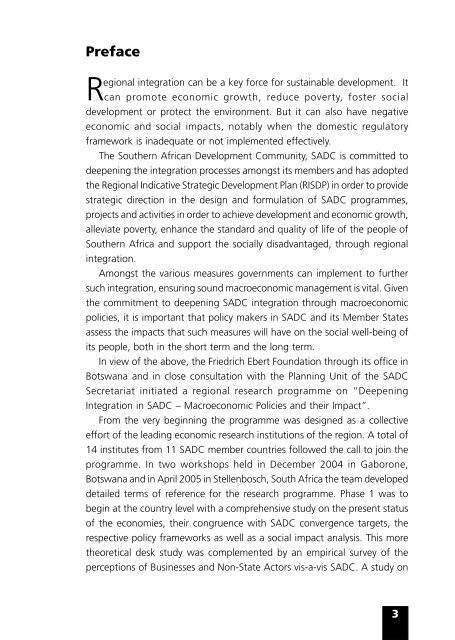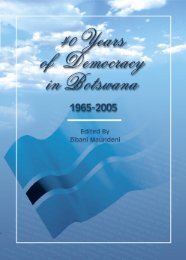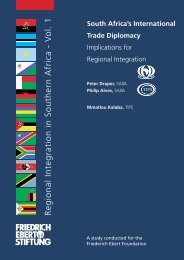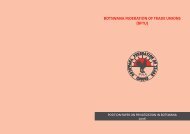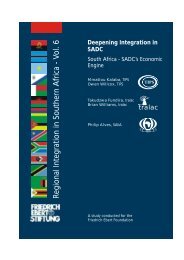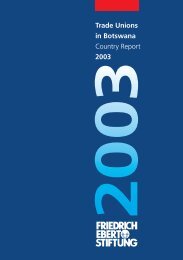Deepening Integration in SADC - Fes-botswana.org
Deepening Integration in SADC - Fes-botswana.org
Deepening Integration in SADC - Fes-botswana.org
Create successful ePaper yourself
Turn your PDF publications into a flip-book with our unique Google optimized e-Paper software.
Preface<br />
Regional <strong>in</strong>tegration can be a key force for susta<strong>in</strong>able development. It<br />
can promote economic growth, reduce poverty, foster social<br />
development or protect the environment. But it can also have negative<br />
economic and social impacts, notably when the domestic regulatory<br />
framework is <strong>in</strong>adequate or not implemented effectively.<br />
The Southern African Development Community, <strong>SADC</strong> is committed to<br />
deepen<strong>in</strong>g the <strong>in</strong>tegration processes amongst its members and has adopted<br />
the Regional Indicative Strategic Development Plan (RISDP) <strong>in</strong> order to provide<br />
strategic direction <strong>in</strong> the design and formulation of <strong>SADC</strong> programmes,<br />
projects and activities <strong>in</strong> order to achieve development and economic growth,<br />
alleviate poverty, enhance the standard and quality of life of the people of<br />
Southern Africa and support the socially disadvantaged, through regional<br />
<strong>in</strong>tegration.<br />
Amongst the various measures governments can implement to further<br />
such <strong>in</strong>tegration, ensur<strong>in</strong>g sound macroeconomic management is vital. Given<br />
the commitment to deepen<strong>in</strong>g <strong>SADC</strong> <strong>in</strong>tegration through macroeconomic<br />
policies, it is important that policy makers <strong>in</strong> <strong>SADC</strong> and its Member States<br />
assess the impacts that such measures will have on the social well-be<strong>in</strong>g of<br />
its people, both <strong>in</strong> the short term and the long term.<br />
In view of the above, the Friedrich Ebert Foundation through its office <strong>in</strong><br />
Botswana and <strong>in</strong> close consultation with the Plann<strong>in</strong>g Unit of the <strong>SADC</strong><br />
Secretariat <strong>in</strong>itiated a regional research programme on “<strong>Deepen<strong>in</strong>g</strong><br />
<strong>Integration</strong> <strong>in</strong> <strong>SADC</strong> – Macroeconomic Policies and their Impact”.<br />
From the very beg<strong>in</strong>n<strong>in</strong>g the programme was designed as a collective<br />
effort of the lead<strong>in</strong>g economic research <strong>in</strong>stitutions of the region. A total of<br />
14 <strong>in</strong>stitutes from 11 <strong>SADC</strong> member countries followed the call to jo<strong>in</strong> the<br />
programme. In two workshops held <strong>in</strong> December 2004 <strong>in</strong> Gaborone,<br />
Botswana and <strong>in</strong> April 2005 <strong>in</strong> Stellenbosch, South Africa the team developed<br />
detailed terms of reference for the research programme. Phase 1 was to<br />
beg<strong>in</strong> at the country level with a comprehensive study on the present status<br />
of the economies, their congruence with <strong>SADC</strong> convergence targets, the<br />
respective policy frameworks as well as a social impact analysis. This more<br />
theoretical desk study was complemented by an empirical survey of the<br />
perceptions of Bus<strong>in</strong>esses and Non-State Actors vis-a-vis <strong>SADC</strong>. A study on<br />
3


